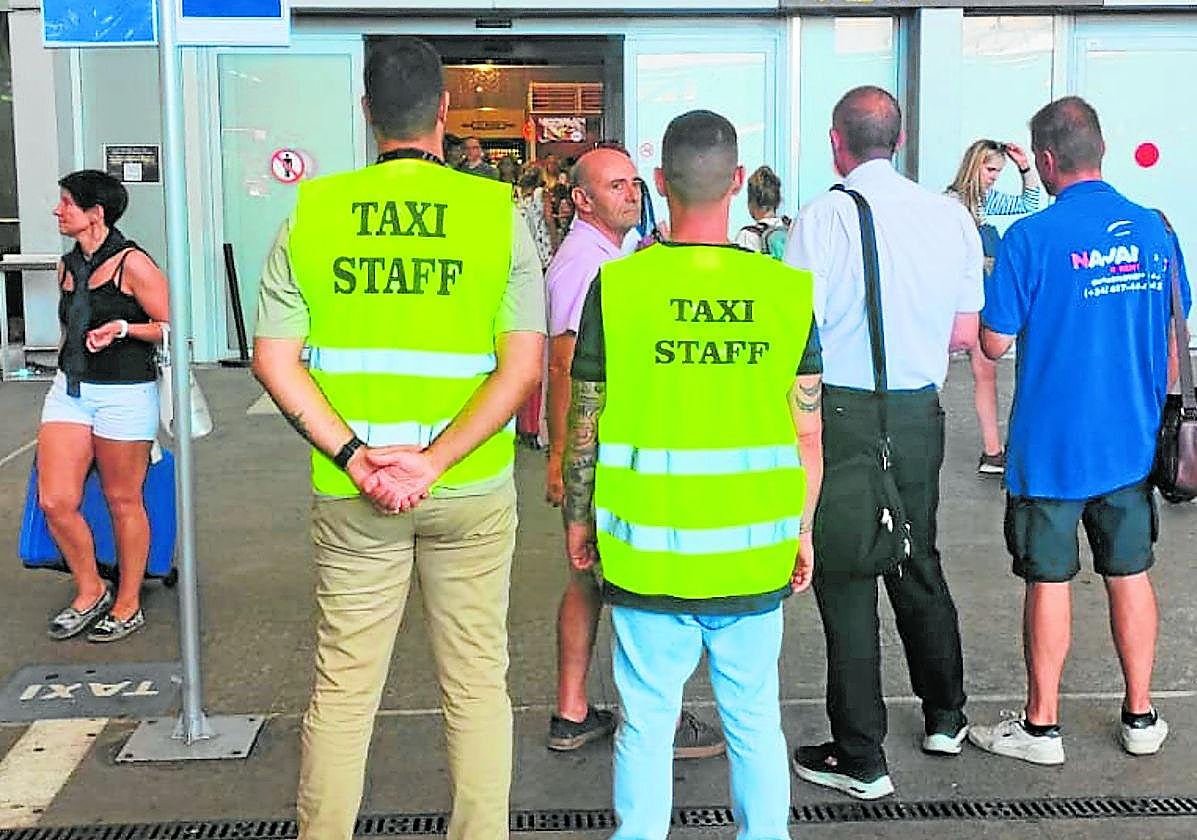Malaga airport: taxi drivers get organised to drive away unlicensed cabbies
Official drivers guard the Arrivals exit to prevent the illegal touting of unsuspecting tourists by those they call 'pirates', not an easy task as they receive insults and threats
The airport is the most profitable territory for taxi drivers in Malaga. The constant stream of arriving tourists makes up a significant part of their income. This especially applies in summer, being high season, when the juiciest rides arrive. A trip from the airport to towns and cities such as Marbella, Granada, Algeciras, Gibraltar or even Seville is a good earner.
For some time now these licensed taxi drivers have had to live with the so-called 'pirates' who prowl the airport. These are unlicensed drivers who try to make a killing in Arrivals by catching tourists off-guard. They almost always pass themselves off as official taxi drivers and take advantage of the fact that many foreigners do not know how the transport service works.
Tired of this situation, after seeing how for a long time they were losing customers on a daily basis, taxi drivers decided to organise themselves to put a stop to these illegal touts. With this aim in mind, 'Infotaxi AGP' was born. Set up in groups of five or six, divided into three shifts covering the whole daily schedule of inbound flights, they go to the Arrivals exit where the touts would usually try to pick up tourists and warn people that they are about to accept an illegal service.
"Most of them are not even aware and immediately thank us for our work. We show them where the official taxis are," explained Santiago Marín, the taxi driver who came up with the initiative. After two weeks in operation, the outcome is positive. "We have managed to oust the 'pirates' and we are preventing them from attracting tourists quite effectively," says Marín.
The direct consequence of this initiative has been an increase in tension between both sides. According to what the taxi drivers say, as a result of seeing lost business the 'pirates' have become more aggressive with threats, insults and attempts at intimidation. "They have even chased me to my house," says Marín.
Taxi drivers claim that illegal drivers threaten them and follow them home in order to intimidate them
There are many witness accounts like that of Santiago Marín, although most of them do not want their full names to be known. "I'm not afraid of them, but I don't want them to know my surname either," said José, a taxi driver who continued in the trade after his father retired.
He confirmed the effectiveness of the work of 'Infotaxi AGP'. "Until now, you were in the queue [at the rank] and if you saw one of these pirates you tried to tell him that what he was doing was illegal, but you couldn't do much more. You had to hurry back to your taxi in the queue," he said.
Now, with the taxi drivers organised into patrols that cover the whole day, they see for the first time how they are taking the business away from the unlicensed drivers.
"The colleagues are then compensated with overtime at the airport," he said. Calling them 'pirates' is an understatement for Jesús. "I would say they are mafiosi. They follow us home to intimidate us. Those are mafia methods. They are getting twitchy because we are taking back what is ours."
Bad image
In addition to the unfair competition that this practice entails, taxi drivers point to the bad image it gives tourists. If the gateway to the Costa del Sol is the airport, the first experience many get is being ripped off. Taxi fares have fixed rates to each destination. The 'pirates', depending on the language spoken by the traveller, change what they will charge. There is no meter on these 'taxis', so anything goes and the fare charged is arbitrary.
Vanessa is another driver who has joined this vigilante group, or group of information providers, as she prefers to call it. "Until now, they were free to roam as they liked. They would pick up tourists without anyone doing anything. We used to call the local police, but they told us that they couldn't do anything if they didn't catch the 'pirate' drivers when they took someone on board," she says. Official police reports over the years would have been few and far between.
Marín is proud of how the first few weeks have gone, although he acknowledges that the 'pirates' "have become more aggressive." To avoid getting into altercations or confrontations, Infotaxi AGP has drawn up a code of good practice.
"Whatever happens, we don't engage in altercation or physical violence. It's just what they want. When we see that things are escalating, we call the police," he said.

